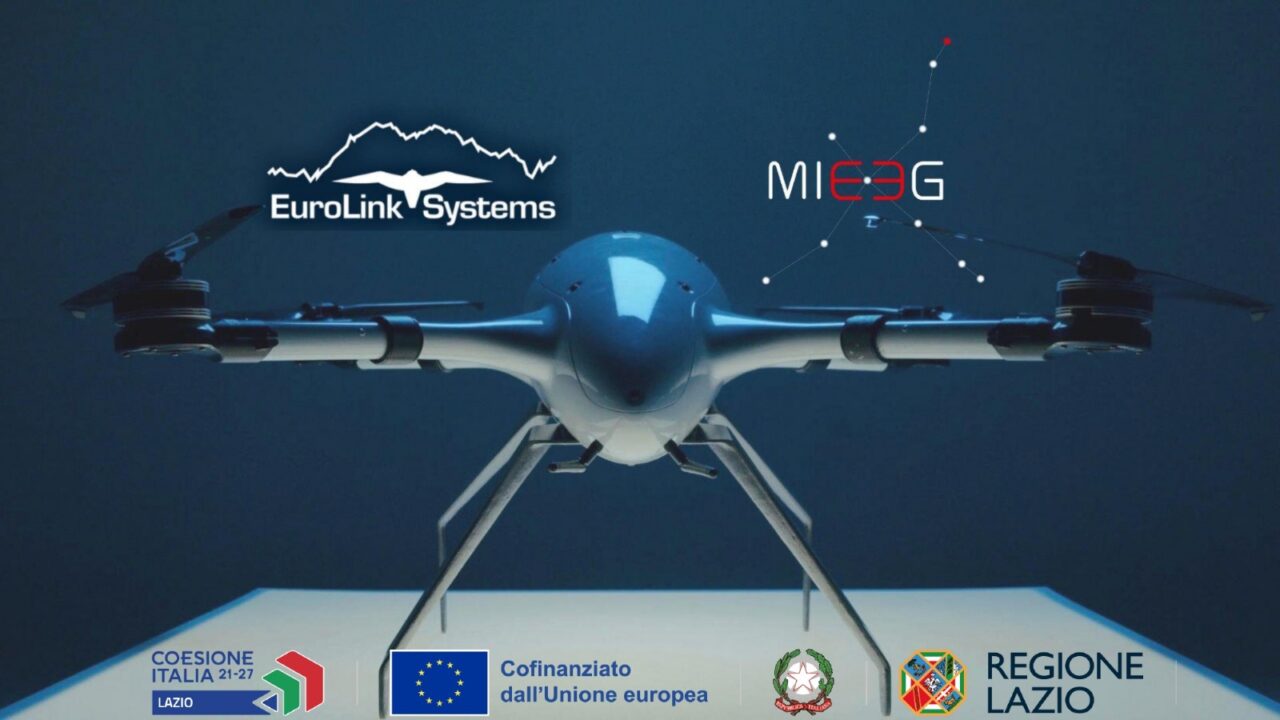MIEEG and Eurolink Systems win Regione Lazio funding to develop an environmentally sustainable, hydrogen-powered tethered four-rotor drone
Two highly innovative companies in their respective fields are joining forces to design and build the unmanned aircraft systems of the future. MIEEG and Eurolink Systems Srl have won the Regione Lazio’s Competitive R&D&I repositioning call, which aims to help high-tech companies operating in the region to carry out research, development and innovation (RDI) projects that can contribute to economic growth and, therefore, job creation.
Specifically, the MIEEG and Eurolink Systems project aims to develop, within 18 months, an all-electric four-rotor tethered UAV powered by hydrogen through an innovative hybrid generator.
Unlike conventional UAVs, tethered UAVs are characterised by being tethered to the ground by a light but very strong cable. This has several advantages, including the ability to stay aloft for long periods and to transmit real-time data at maximum speed. Tethered drones are used where there is a need to monitor and re-establish communications in limited areas for long periods. This type of UAV is growing rapidly in the market, with a range of potential customers, public or private, national or international, interested in innovative drones with low environmental impact and high autonomy. In this sector, Eurolink Systems has already developed experience that has led to patented solutions.
Compared to current tethered drones, which are tied to a traditional battery power supply, the project aims to use a hybrid electric generator, powered by hydrogen, miniaturised and high performance, based on the MIEEG patent, which is already recognised in several countries around the world, covering over 55% of the population and over 73% of the world’s GDP. The project aims to extend the operation of the Beluga@TM model developed by Eurolink Systems, thus reducing the pollution caused by fossil fuels and at the same time reducing the use of electric batteries, a goal that is now unavoidable also for geopolitical reasons.
MIEEG and Eurolink Systems are convinced that hybrid systems are the most suitable and environmentally sustainable solution for the design of future aircraft, both manned and unmanned. In particular, MIEEG will develop the range extender, while Eurolink Systems Srl will develop the drone. The project can be considered strategic for both companies, as it will allow them to strengthen their specific competencies in their respective fields (development of the range extender for MIEEG and of the drone-tethered system for Eurolink Systems), making them even more competitive on the existing market. It will lay the foundations for an industrial-commercial cooperation between MIEEG and Eurolink Systems themselves.
MIEEG, a startup founded in 2019, is developing a hydrogen-powered electricity micro generator that features small size, high power, scalability, and integration with green energy systems, such as wind or solar. The innovative generator can be used as a range extender for all-electric systems (drones, planes, helicopters, electric cars, ships) or as a power generator for homes, hospitals and smart islands. In particular, the latter case envisages integration with green systems to use excess energy to self-produce hydrogen from wastewater to power the MIEEG when required. This identifies innovative, hybrid, circular energy systems for a new, energy-independent living infrastructure concept.
Eurolink Systems, an innovative SME founded in 1994, specialising in the distribution and integration of Commercial Off The Shelf (COTS) hardware and software solutions for signal processing in mission-critical applications in the defence and aerospace markets.
ELS is a reference supplier of embedded electronics solutions to major industrial groups, in particular Leonardo and ELT. Since May 2019, it has joined the Elite Leonardo Lounge Programme, selected to participate in the first class of Leonardo supply chain companies operating in the aerospace and defence sector.
After several years of research and development, the Beluga@TM drone is being launched to represent the state of the art in multimission/multidomain UAVs. Among its main features
completely designed in Italy, a limited logistic footprint thanks to the ability to be operational in less than 5 minutes, take-off and landing in water, low acoustic signature and a speed of up to 110km/h. Furthermore, the Beluga@TM can integrate a wide range of sensors (EO/IR, multispectral, lidar, GPR, laser designator, RF catcher, CBNR, etc.), containers, making its applications virtually limitless.


